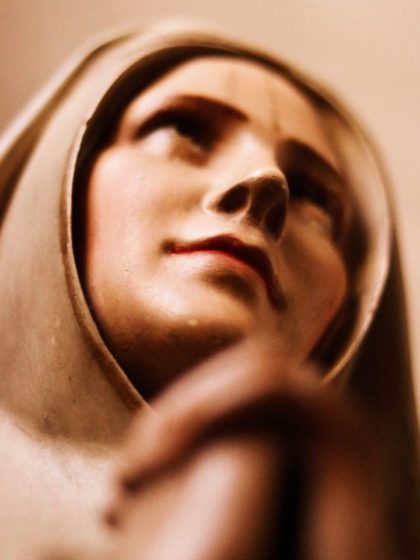The women of the Bible are often ignored. It’s a shame because the women of the Bible often model faith and courage that exceeds the men. As they do, they also challenge the patriarchal systems of the biblical world and of our world.
Certain Bible passages have been used throughout Christian history to marginalize and silence women. This is tragic on many levels, including the fact that the Bible is actually very pro-women.
In fact, if you read the Bible, you could more easily come away thinking that the Bible is anti-men. Men are often portrayed in the Bible as failures who mess things up for everyone else. The kings of the Bible are almost all bad. Moses wasn’t allowed to enter the Holy Land because he disobeyed God. King David made disastrous decisions that led to the downfall of Israel and civil war within his family. The disciples promise to follow Jesus all the way to the cross, but then they run away. So, maybe the real question isn’t if the Bible is anti-women, but if the Bible actually anti-men.
… the women of the Bible often model faith and courage that exceeds the men.
And we can go further. The Bible frequently portrays women as faithful and determined. They often participate in nonviolent civil disobedience and are the best interpreters of scripture and preachers of the resurrection. So, in order of appearance, here are my top 5. (For more, check out Lindsey Paris-Lopez’s article “5 Women of the Bible Who Smash the Patriarchy.”)
1. Shiphrah and Puah (Exodus 1)
There are so many amazing women in the Bible. I’m sure you have your own, and I’d love to hear about them. I’ll give you my top five. But I’m going to cheat right off the bat. My first two favorite women in the Bible go together – they are named Shiphrah and Puah.

At the beginning of Exodus, the Pharaoh of Egypt enslaved a small group of people called the Israelites. Key to this story is that the Israelites have a favorite commandment from their God – to be fruitful and multiply. They multiply like rabbits. Pharaoh becomes fearful of the Israelites and demands that the Hebrew midwives, named Shiphrah and Puah, kill all the boys.
The story says, “But the midwives feared God; they did not do as the king of Egypt commanded them, but they let the boys live.” The Pharaoh soon found out the midwives weren’t following his command and asked why they let the boys live. They responded, “Because Hebrew women are not like Egyptian women; for they are vigorous and give birth before the midwife comes to them.”
Shiphrah and Puah disobeyed and lied to the government authorities. They cause some good trouble. And because they acted with nonviolent civil disobedience, the story says, “God dealt well with the midwives.” God approved of their resistance to oppressive governmental authorities.
The Olive
Branch
Take A Breath with Us
Our weekly newsletter creates a space to take a breath. Once we slow down, we can see the way desire, imitation, and conflict operate in our lives and in the world, and begin to create peace. In addition to the newsletter, you will receive the free "Unlearn the Bible" ebook when you subscribe.
2. The Queen of Sheba (1 Kings 10 and 2 Chronicles 9)
The Queen of Sheba heard rumors about the extreme wealth and wisdom of King Solomon. The rumors were so captivating that she had to see for herself if they were true. So she traveled to Jerusalem with her entourage and plenty of gifts to offer the King of Israel.
Once she arrived, the Queen of Sheba discovered that the rumors about Solomon were true. She even told Solomon, “… your wisdom and prosperity far surpass the reports that I had heard.” When she observed Solomon’s massive house, rich food, numerous servants, posh clothing, and extravagant religious sacrifices, she was astounded.
But the Queen of Sheba was no mere fangirl. She confronted Solomon and told him he had a mission. How would Solomon use his wealth and political power? She exhorts Solomon, saying, “Because the Lord loved Israel forever, he has made you king to execute justice and righteousness.”
The Queen of Sheba reminds Solomon that he was blessed with wealth and political power for a purpose – to execute justice and righteousness for the people.

Did Solomon execute justice and righteousness? Solomon is known for creating massive temples and houses and other buildings. How did he create them? The Bible says he used conscripted labor from his own people. What’s another word for conscripted labor? He enslaved them. Solomon became a political leader just like the unjust Pharaoh of Egypt. The Queen of Sheba reminded Solomon that the true God is a God of justice, not a God of oppression. But Solomon refused to listen to the Queen of Sheba.
3. The Prophetess Huldah (2 Kings 22 and in 2 Chronicles 34)
Third, a woman named Huldah. If you or someone you know is having a girl, you have found her name. (That’s a joke. Please, don’t name her Huldah. It will not go well for her…) Huldah was a prophet. Did you know there are female prophets in the Bible? The king of Israel during the time found a long lost sacred book in the Temple. Every scholar I have read thinks the book was Deuteronomy, which became one of the most important books in the Hebrew Bible.
Everyone knew this book was vitally important, but no priest or prophet could interpret what this new book said. The high priest at the time, along with four other men, went to Huldah and asked her to explain the book to them. Huldah taught a bunch of men the meaning of one of the most important books in the Hebrew Bible. From these stories it’s clear that Huldah was accustomed to speaking the word of God to priests, royal officials, and told kings what God willed.
4. Mary of Nazareth (Luke 1)

The third is Mary of Nazareth. Every Advent season we read from Mary’s Magnificat. There she says that God is doing something radical in the world – God is bringing down the powerful from their thrones and lifting up the lowly. God is feeding the hungry with good things and sending the rich away empty.
Mary calls for a political and economic revolution that would subvert patriarchal systems that benefit the rich and powerful at the expense of the poor and weak. Sister Elizabeth Johnson wrote, “The Magnificat is a revolutionary song of salvation whose political, economic, and social dimensions cannot be blunted. People in need in every society hear a blessing in this canticle. The battered woman, the single parent without resources, those without food on the table or without even a table, the homeless family, the young abandoned to their own devices, the old who are discarded: all are encompassed in the hope Mary proclaims.”
5. Mary Magdalene and Joanna (Luke 8, John 21)
Okay. I’m cheating here, too. But when Mary Magdalene is introduced in Luke 8, so is a woman you probably haven’t heard of – Joanna. Luke briefly tells us that Joanna and Mary were with Jesus. Luke says that Joanna was “the wife of Herod’s steward Chuza” and that Joanna, along with other women, funded Jesus’ mission.
It’s easy to read past this small detail, but it is incredibly subversive. Herod was the major political player in the region during this time. He helped orchestrate Jesus’ execution. Chuza was Herod’s steward who managed Herod’s money. And guess what Chuza’s wife was doing with that money? Joanna used Herod’s money to fund Jesus’ ministry.
Mary Magdalene was one of Jesus’ closest and most loyal friends. In fact, at the crucifixion, when according Matthew, Mark, and Luke, all the male disciples ran away, but the female disciples followed Jesus to the cross. Matthew and Mark tell us that Mary Magdalene watched as her friend was being murdered.
And John tells us something more. After Jesus was crucified and buried in a tomb, John tells us that Mary went to the tomb on the morning of that third day and discovered that the tomb was empty. She ran to tell the men that Jesus’ body had been stolen. Peter and another disciple ran to the tomb, but when they saw it was empty, they returned to their homes.
Mary stayed behind at the tomb and wept. The resurrected Jesus came to her and said, “Mary!” When Mary heard her name, she recognized Jesus. He told Mary, “… go to my brothers and say to them, ‘I am ascending to my Father and your Father, to my God and to your God.’”
BONUS – Phoebe (Romans 16)
No article on women of the Bible could be complete without talking about Phoebe. That’s because there’s this guy named Paul, who wrote a bunch of letters in the New Testament. Some of those letters claim that women should be silent in church and shouldn’t teach men.
When I took my intro to the New Testament course in seminary, our professor told us that these were probably not authentic to Paul, but were later additions by a scribe who wanted to silence women. (If you’d like a deep dive into the evidence, see evangelical scholar Scot McKnight’s article here.)
Part of the evidence for this fact is a woman named Phoebe. The Letter to the Romans is Paul’s longest letter. It might also be his most important – and his most confusing. Scholars today still debate the intricacies and complexities of this letter.
In Romans 16, Paul says, “I commend to you our sister Phoebe, a deacon of the church at Cenchreae, so that you may welcome her in the Lord as is fitting for the saints…”
Scholars like Reta Finger and Scot McKnight claim that Paul sent his letter to the church in Rome with Phoebe. As the one carrying the letter, Phoebe was also the one who read the letter to the church and explained it to the men and women there by answering any questions they had.
Phoebe was the first interpreter of the most important letter written by Paul. She spoke in the church. So, whenever some guy wants to use Paul to silence women, just tell them about his most trusted friend and interpreter, a woman named Phoebe.
There are so many more women in the Bible who do this, including Deborah, Rahab, Vashti, Ruth, Esther, Dorcas, and Junia. I wonder, who are some of your favorites? Let me know on our Facebook page here.
